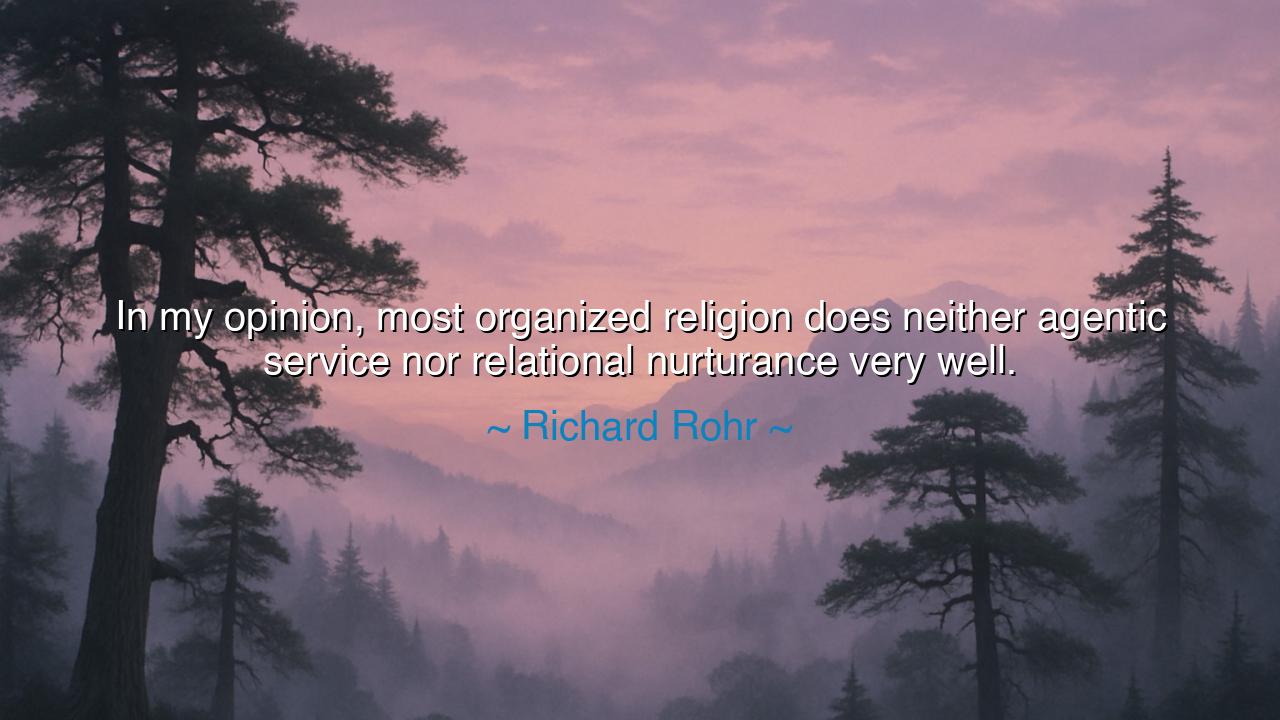
In my opinion, most organized religion does neither agentic
In my opinion, most organized religion does neither agentic service nor relational nurturance very well.






In the long history of human striving toward the divine, religion has often been seen as the pathway to enlightenment, comfort, and salvation. Yet, in the words of Richard Rohr, a contemporary spiritual teacher and Franciscan friar, there is a sober reflection on the state of organized religion today: “In my opinion, most organized religion does neither agentic service nor relational nurturance very well.” This statement resonates deeply, not just as a critique but as a call to reflection on the nature of religious institutions and their role in the modern world. For Rohr, the heart of religion should lie in service to others and in fostering deep, relational connections—but he suggests that many religious institutions fall short of these essential duties.
Rohr’s critique speaks to the nature of organized religion itself, which, over time, has often become entangled with structures of power, ritual, and institutional control. While religion is meant to serve as a source of connection to the divine, the struggle for control can sometimes obscure its primary purposes. In the ancient world, religion was deeply embedded in the fabric of society, but often, it became more about maintaining order and control than about fostering true spiritual growth. Ancient Egypt, for example, saw its pharaohs not only as political rulers but also as divine figures. While religion was central to the lives of the people, it was used as a tool to reinforce authority, keeping the masses bound to their rulers through religious dogma and ritual.
Similarly, in the Middle Ages, the Catholic Church held immense influence, but it became more focused on the accumulation of wealth and power than on the true spiritual welfare of its followers. The construction of stunning cathedrals and the accumulation of riches by the clergy often stood in stark contrast to the humble teachings of Jesus Christ, who spoke of serving the poor, of loving one’s neighbor, and of forgiveness. The inquisitions and crusades that followed in the name of Christianity often served not to nurture relationships but to enforce orthodoxy through fear and violence. Rohr’s observation, then, is not new but taps into an ancient reality: organized religion can sometimes be more about maintaining control than fulfilling its divine calling to serve and nurture relationships.
The second part of Rohr’s statement—“relational nurturance”—points to the importance of creating authentic, transformative connections between individuals. Religion, at its core, should cultivate relationships based on compassion, understanding, and love. Jesus, the central figure of Christianity, spoke not just of belief, but of relationship—with God, with others, and with oneself. In the Sermon on the Mount, he emphasized that love for one’s neighbor and reconciliation between people were at the heart of the divine law. Similarly, the teachings of Buddha and the prophets of other faiths focused on fostering a deep sense of compassion and connection among human beings, seeing the divine in the face of others. Yet, modern religious institutions often struggle to maintain this nurturing quality, as their rituals and structures can sometimes distance believers from one another, focusing more on doctrinal purity than on fostering loving, meaningful relationships.
One could look at the story of Saint Francis of Assisi, who stands as an ideal of agentic service and relational nurturance. Saint Francis founded the Franciscan Order, not as a power structure or a tool for political control, but as a movement that sought to serve the poor, heal the sick, and foster relationships of compassion between all people. His deep relationship with nature, with others, and with the divine is what made his religious life a living example of the very service and nurturance that Rohr speaks of. In Francis, we see the possibility of religion that is not about power but about a deep, transformative connection to others and to the divine. He showed that the true measure of faith lies not in grand institutions but in the humble acts of service and love that bind us together as human beings.
The lesson that Rohr teaches us through his critique is one of reclaiming the true essence of religion. Faith should be more than just a set of doctrines or practices that keep people in line. It must be a living, breathing force that connects us to one another, that guides us toward service, and that helps us nurture relationships grounded in compassion and understanding. As individuals, we must challenge the systems and structures that fail to meet these needs, both within religious institutions and in the wider world. We must ask ourselves: does our faith lead us toward action in the world, toward helping the oppressed, serving the sick, and loving our neighbors? Does it nurture the relationships that make us more fully human, or does it keep us distant, locked in doctrines that serve only to separate us from each other?
The path forward, then, is clear: we must seek a faith that is more than just a ritual; we must seek a faith that is active and alive in our lives, one that drives us to serve others, to build community, and to nurture relationships that are rooted in love. Whether we find that faith in Christianity, Buddhism, Hinduism, or any other tradition, let us make it our goal to live a faith that is not about dogma, but about action—one that calls us to serve and love as Jesus, Buddha, and all the great spiritual teachers have called us to do. By doing so, we move closer to fulfilling the divine purpose of religion: to heal, to serve, and to connect.






AAdministratorAdministrator
Welcome, honored guests. Please leave a comment, we will respond soon